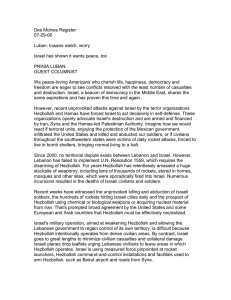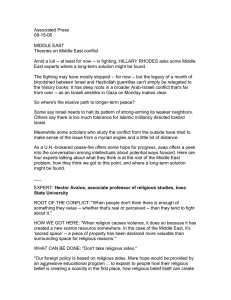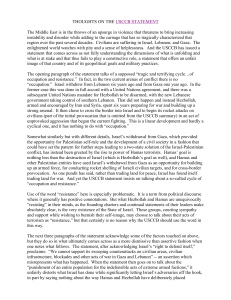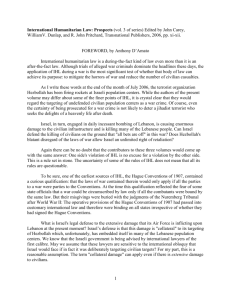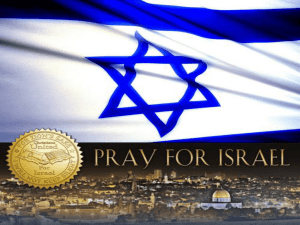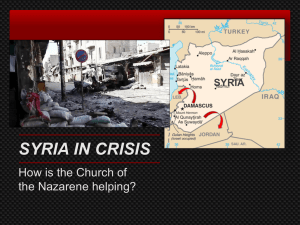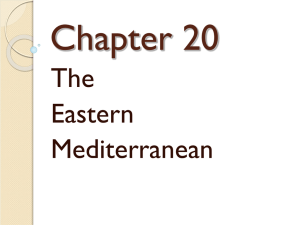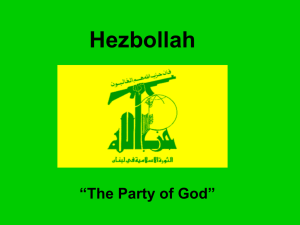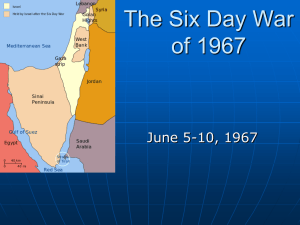- NDC Foundation
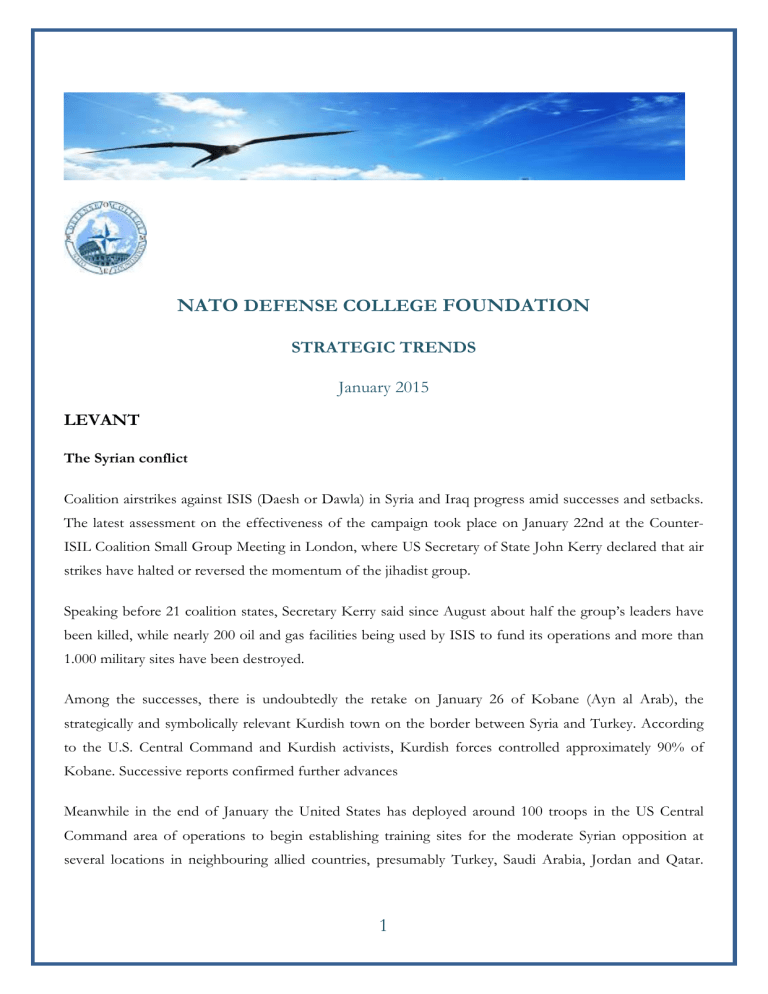
LEVANT
The Syrian conflict
NATO DEFENSE COLLEGE FOUNDATION
STRATEGIC TRENDS
January 2015
Coalition airstrikes against ISIS (Daesh or Dawla) in Syria and Iraq progress amid successes and setbacks.
The latest assessment on the effectiveness of the campaign took place on January 22nd at the Counter-
ISIL Coalition Small Group Meeting in London, where US Secretary of State John Kerry declared that air strikes have halted or reversed the momentum of the jihadist group.
Speaking before 21 coalition states, Secretary Kerry said since August about half the group’s leaders have been killed, while nearly 200 oil and gas facilities being used by ISIS to fund its operations and more than
1.000 military sites have been destroyed.
Among the successes, there is undoubtedly the retake on January 26 of Kobane (Ayn al Arab), the strategically and symbolically relevant Kurdish town on the border between Syria and Turkey. According to the U.S. Central Command and Kurdish activists, Kurdish forces controlled approximately 90% of
Kobane. Successive reports confirmed further advances
Meanwhile in the end of January the United States has deployed around 100 troops in the US Central
Command area of operations to begin establishing training sites for the moderate Syrian opposition at several locations in neighbouring allied countries, presumably Turkey, Saudi Arabia, Jordan and Qatar.
1
However, these are merely preliminary moves as the recruiting and vetting process, not yet began, is expected to take three to five months and the actual training to begin in early spring.
Overall, this sort of hesitations, would suggest the military campaign against ISIS to be far slower and less effective that suggested by the official statements. On the other hand the search for a political solution continues to be stalled. The peace talks hosted by Moscow on January 26 have been a significant fiasco: the main umbrella opposition group, the US-supported Syrian National Coalition, didn’t take part in the discussions, and Syrian government officials attended without any commitment. The chaos and hopelessness in Moscow mirrored that of the parts involved in the conflict: the Assad regime is viewed alternatively as an enemy whose exit is necessary to the end of the conflict, an untouchable ally, one of the few structured forces capable of containing ISIS. Likewise the UN proposal for a ceasefire in Aleppo doesn’t seem to hold ground, especially considering the imbalance of power in Aleppo that would make it illogical for Assad to deny himself what many see as an inevitable victory.
The domino effect: new fronts in Israel and Lebanon?
The 18 th of January an Israeli attack helicopter struck near the Syrian city of Quneitra, in the Golan
Heights, a group of cars with antitank missiles. The attack delivered perhaps the highest-profile blow to
Hezbollah and Iranian interests, operating very closely in the Syrian conflict, since the outbreak of war.
The casualties from the attack included an Islamic Revolutionary Guard Corps (IRGC) Gen. Mohammad
Ali Allahdadi and several Hezbollah commanders, allegedly also Abu Ali Tabatabai, a leading commander in control of one of the group’s major rapid reaction/special forces units.
Exactly ten days later Hezbollah retaliated through a missile attack in the Sheba’a Farms, a disputed strip of land in the Golan Heights abutting southern Lebanon. Israel Defence Forces positions along the border in Mount Hermon were also hit by mortars. Israel responded again, hitting Syrian Army artillery positions in the Golan and shelling southern Lebanon. The most impact of this incident is that the line stretching from Naqoura, located to the west of the Mediterranean Sea in the south, to the occupied Syrian Golan
Heights in the east, has now become a single front.
The exchange of fire triggered a substantial political reaction from Hezbollah, whose Secretary-General
Hassan Nasrallah delivered an inflamed speech regarding the party’s stance on Israel and the developing confrontation. During the speech Nasrallah declared that the Israeli airstrikes had shattered the rules of engagement between his party and Israel and announced that the party stays ready to wage war, should provocations continue.
2
To some analysts Nasrallah’s attitude has been emboldened by the immediate and outraged reactions in
Tehran, and particularly within the IRGC, whose commander of the “Quds” special forces division and the mastermind for operations in Syria and Iraq (General Qassem Soleimani) visited Beirut to pay tribute to the victims of the Quneitra attack.
Though the violence sparked fears of another Hezbollah-Israel conflict, à la 2006, neither Israel nor
Hezbollah seem realistically interested in escalating the situation further. Israel goes to the polls in March, and, given that Israelis are still weary after last summer’s 50-day war with HAMAS in Gaza, Netanyahu may not want to get embroiled in another war so close to the elections. On the opposite front, if
Hezbollah, the main Iranian proxy to support the Assad regime in Damascus, were to divert its forces from Syria to a war along the border with Israel, the Lebanese Shiite group would likely find itself stretched too thin, not taking into account the volatile situation in Lebanon itself.
As a matter of fact, Israel’s Defence Minister Moshe Yaalon declared that he has been informed by
UNIFIL, the UN peacekeeping force in Lebanon that Hezbollah was unlikely to escalate the violence further.
Palestinian ICC initiative
On January 2, the Palestinians submitted documents to join the International Criminal Court (ICC), in a move that should guarantee them a formal membership from the 1 st of April.
In retaliation Israel has halted the transfer of tax revenues collected on behalf of the PA, and that make up two-thirds of the Palestinian Authority’s budget. The amount withheld so far, related to the past month, is of $127 millions.
The ICC declared on January 16 it had opened a preliminary examination into the situation in the
Palestinian Territories, i.e. an analysis of the information available in order to determine whether there is a reasonable basis to proceed with an investigation. This is an automatic step taken by the court upon a referral from the Palestinians asking the ICC to investigate alleged Israeli crimes since June 2014.
The Unites States are caught in the middle of this fluid and changing context. On one hand the US criticised the Israeli decision to withhold taxes from the PA, saying it would raise tension. On the other hand, the White House described the Palestinians’ step as “entirely counterproductive” and the US
Congress is debating a bill requiring the US to cut aid to the Palestinian Authority, amounting approximately to $400 million annually, following to the PA war crimes investigations referral to the ICC.
3
